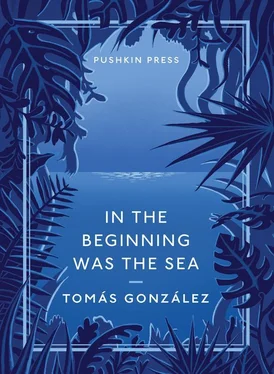“Come on, J.,” Ramiro interrupted, “show me this bull of yours.”
Taking their leave of Don Gabriel (“Probably best if you don’t come, Papá, the less time you spend in the sun the better”), Ramiro and J. headed towards the paddocks.
“Don’t listen to Papá,” said Ramiro. “He’s not been himself recently, you know?”
It was no secret that the old man was not himself, but J. did not understand why Ramiro was apologizing for him; he had often heard Don Gabriel wittering on inanely but never until now had he heard one of his family apologize on his behalf.
Before they reached the field where the bull was kept, it occurred to J. that there was one possible explanation: Ramiro really did want to sell the finca . They had not gone far when Ramiro made him an offer he found difficult to refuse: J. could take over the farm without having to pay out a single peso in the short term — the finca would be paid off in instalments, the first due after three years and the second after five, and the interest Ramiro offered was less than the bank lending rate.
It was obvious Ramiro did not want his father throwing good money after bad on a finca that would never be profitable. Besides, J. knew Ramiro well enough to realize he could barely bring himself to spend two days away from the city; what he needed was a little farm half an hour from Medellín. Five hundred hectares of woodland that were almost in Panama had probably cost him many a sleepless night.
Ramiro studied the bull with polite indifference as the animal went on grazing placidly, surrounded by cattle egrets. He was astonished to learn how much the bull had cost and even more to discover that J. had paid in cash; J. clearly had money and did not invest it wisely.
On the walk back, they talked a little more about the deal. J. said that he was interested and asked for a few days to think it over.
“Think about it as much as you like,” said Ramiro. “Papá and I will be here for a while yet, so there’s plenty of time.”
Since everything of importance had now been said, Ramiro attempted to make small talk, asking J. about his plans for timber production. Reluctantly, knowing Ramiro was not really interested in the subject, J. gave him some superficial details.
“It means hacking down the forest,” he said finally. “It’s a pretty simple process…”
When they arrived back at the house, Elena was out on the veranda talking to Don Gabriel. J. could see the old man’s hand, as gnarled and twisted as a tree root, was resting on Elena’s tanned knee. Seeing him arrive, Don Gabriel did not remove his hand, clearly hoping that it seemed like a paternal gesture. Elena, in a display of filial affection, nestled into the old man’s shoulder and asked to be excused, then went and kissed J. on the cheek. It was the first affectionate gesture she had made in days; indeed it was the first gesture of any kind she had made in a long time. Her desperate need to be free of the mummified hand on her knee, it seemed, had hastened their reconciliation.
“Don Gabriel was just telling me how to treat foot and mouth disease,” she said to J.
“Ramiro’s father is one of the greatest experts on foot and mouth this side of Mexico, hermana . You should listen to him.”
The old man looked flattered; Ramiro felt an uncomfortable tingling in his brain.
Before they left, Don Gabriel offered a laboured theory on the best system for sheep farming in the area. After he had mounted his horse to leave, he called J. over and, whispering in his ear, said again that the finca would be sold over his dead body. J. told him not to worry.
“We’ll talk soon,” said Ramiro. “I’ll drop by later this week so we can sort things out.”
Elena and J. stood on the veranda watching as the horses trotted away.
“I’m going to go for a little swim, I won’t be long,” said J. when the horses had disappeared. “If foot and mouth shows up, tell it to wait until I get back.”
Elena bowed her head to hide her smile.
…and so he ended up with all this land. I’m not criticizing him, I love the guy as much as anyone, but frankly I think he had delusions of grandeur. When he died, he owned over a thousand hectares — can you imagine? He had a lumber business — at least that’s what I’ve heard — and the lumbermen were allowed to cut down what they wanted whenever they felt like it. There was no system to what he was doing out there on the finca . Actually, the last time I saw him in Bogotá, he was blind drunk, ranting and raving about everyone and everything like a moron. He insulted my mother, me, you, Elena — the whole human race in general. “The human being is a piece of shit, the human being is a piece of shit, the human being is a piece of shit…” He must have said that a thousand times before he finally fell asleep. The next morning, he didn’t remember a thing. Can you imagine a guy like that running a sawmill with fifteen lumbermen in Turbo? I mean, the balls of the guy! I think Jorge was right — what with the whole highbrow-anarcho-lefty businessman bullshit, that mixture of colonial, bohemian and hippie could never have survived. It’s astonishing he reached the age of thirty-four.
I’m worried this letter will leave you even more confused than you were, but the thing is I’m not exactly the best person to try and explain this whole mess. The reason I’m writing is not because I think I understand what happened, but because I know you must be feeling shocked and terribly alone after his death. I was more surprised than anyone when I found out what he was doing at the finca . As I understood it, the original plan was just to move out to the sea and enjoy life, buy a little boat for fishing, a few cows, a few chickens. When he asked my advice on the first farm, I told him I thought it sounded too big, but then again he didn’t need to use all the land or walk the fields every day. Obviously he didn’t listen to me. Maybe he had some bourgeois dream of being a landowner… I don’t know, I still don’t get it. But buying the second finca was sheer madness — not that he asked my opinion. Though, as you know, by then our friendship was a bit strained. But, since I’ve raised the subject, there’s something I’d like to say — as much for my own peace of mind as for yours. Even with everything that happened, we were still fond of each other. Right to the end we still loved each other. But he started to attack me — especially when he was shitfaced — for what he called my intellectual snobbery. Basically, he accused me of becoming pretentious after I moved to Bogotá, of being pretentious. What hurt me most was that he would come out with all this shit with a kind of primitive — and in his case completely phoney — machismo of a guy who feared neither God nor man, it was like some pathetic attempt to portray himself as some kind of outlaw, a mixture of Jimi Hendrix and a character out of Rivera’s The Vortex . I visited him in Envigado once and I didn’t like what I saw. By that time, he’d been living on the finca for a while, and this was the first time he and Elena had come back to town together. They’d been there for a week, boozing every night, and when I got to their apartment they were in the middle of a serious session — booze, dope, pounding music — and the place was crawling with freeloaders and hangers-on. He and Elena were playing up the role of beatnik rebels, people who don’t believe in anyone or anything, hardened by the sea and the salt air — you get the idea.
As usual, J. was the one paying for the booze, the weed, the music, even the food.
The two of them were unbearable. They were horribly aggressive, all glib contemptuous humour and equally glib anarchism. Obviously the next morning, when they were hungover, they were back to being their friendly, normal selves. Elena was kind and gentle, nothing like the proud courtesan she’d been posing as the night before. I said to J. — and maybe this was a little tactless — I said he should be a little more wary of these provincial parasites from Envigado who were only out for what they could scrounge. J. reminded me — and I suppose he had a point — that I was from Envigado just like them, even if I had studied literature and philosophy in Bogotá, and he accused me of wasting my life in mental masturbation because I was afraid of facing up to real life, of being too quick to judge and too smug about it… I said exactly what I’ve said in this letter, that he was turning into [words crossed out] and Elena was turning into some punk version of María Félix. Obviously we made up again, in fact J. even spent the whole afternoon referring to Elena as “María”. But after that we were always a little wary of each other, we treated each other with kid gloves, we never talked about anything in detail and both of us just assumed that we were right…
Читать дальше










